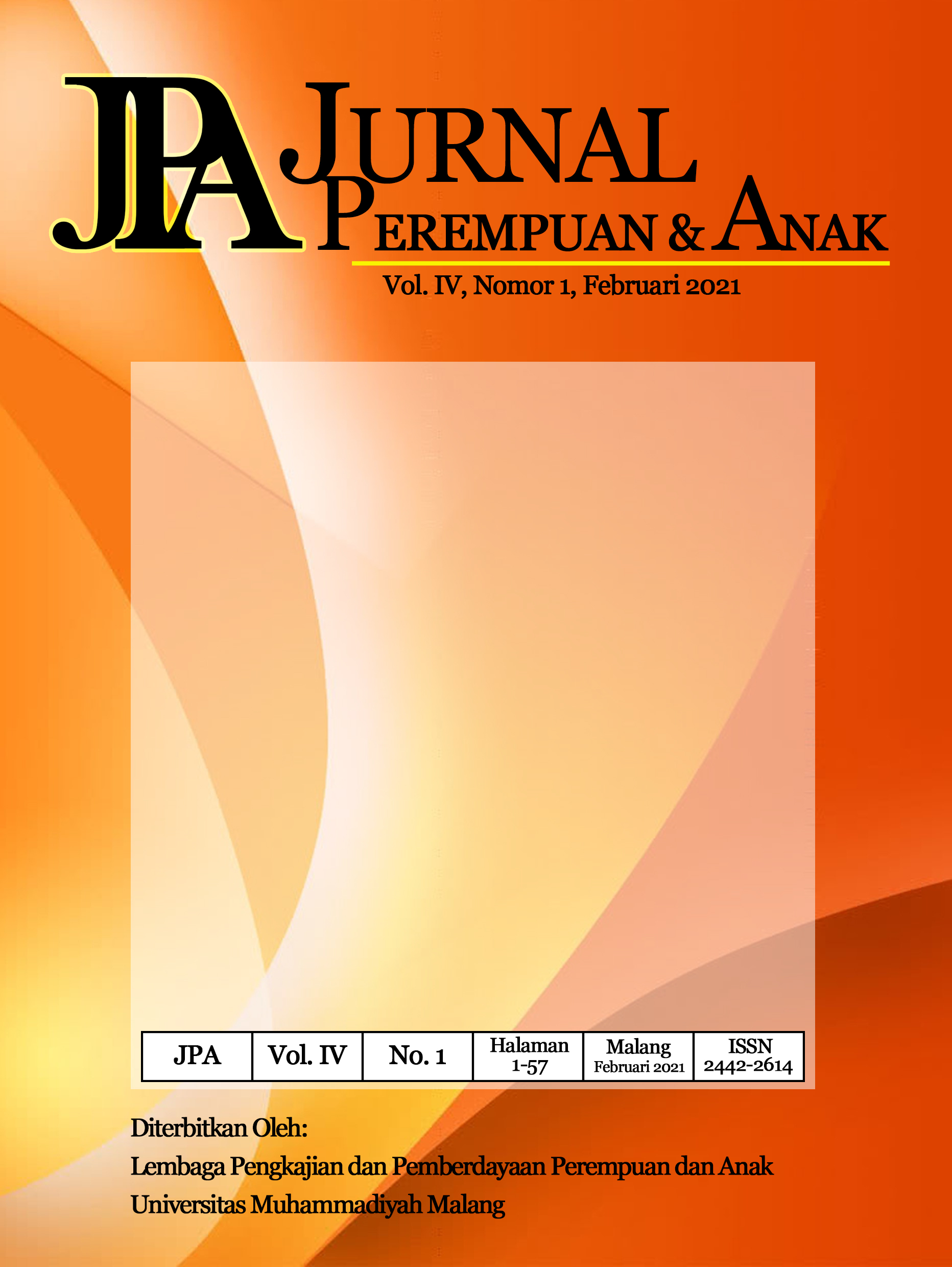Women’s Voluntaristic Actions in Playing Multiple Roles (A Study on Home worker Housewives from Underprivileged Families in Polehan Village, Malang)
DOI:
https://doi.org/10.22219/jpa.v1i1.17509Keywords:
Voluntaristic Actions, Women Home Workers, Dual RolesAbstract
Women are creatures who have been assumed as the second-class citizens or only engaged in domestic activities. It arises because of the feminine nature that has been attached to women. However, as time goes by, the rules and values of women have changed. The emancipation movements appear to bring women to work in the economic sector to take multiple roles. The purpose of this research is to find out how the actions of housewives in running dual roles.
This research uses qualitative approach with descriptive method. Qualitative descriptive is a method in examining the status of a group of people, an object, a set of conditions, a system of thought or a class. The subject of this study as many as ten people. Informant determination technique in this research conducted by purposive sampling technique, the informants are selected based on the characteristics or the predetermined character. Data analysis techniques used are data collection, data reduction, data presentation, conclusion and data verification.
The theory used to analyze this research is Talcott Parsons' voluntaristic action theory, in which a person performs a certain purpose of action. In addition, the aim is achieved by referring to the values and norms, using the tools and means as capital goals by looking at the conditions and circumstances around it.
The results showed that the purpose of housewives performing dual role acts is to improve the family economy as well as the form of self-actualization as a wife, mother a nd a worker. Then, in order to achieve these goals, housewives perform a dual role as home workers, while upholding the values and norms, using the tools and facilities owned, and still pay attention to the conditions and situation surrounding her.
Downloads
References
Abdullah, Irawan. 2001. Seks, Gender, & Reproduksi Kekuasaan. Yogyakarta : Tarawang Pers
Cooper dan Emory, 1996. Metode Penelitian Bisnis. Jakarta:Erlangga
Emzir. 2010. Analisis Data : Metodologi Penelitian Kualitatif. Jakarta : Rajawali Pers.
Fajerman, Miranda. 2013. Tinjauan Kerangka Peraturan Perundang-undangan untuk Pekerja Rumahan di
Indonesia.
Fuad, Anisa & Nugroho, Sapto, Kandung. 2014. Panduan Praktis Penelitian Kualitatif. Yogyakarta : Graha
Ilmu.
Gugler, Josep. 1996. Urbanisasi Kemiskinan di Dunia Ketiga. Yogyakarta : PT. Tiara Wacana
Hadirman F. Budi. 1993. Menuju Masyarakat Komunikatif. Yogyakarta : Kanisius
Hamidi,2004. Metode Penelitian Kualitatif, Malang : UMM Press
Haryano,Sindung. 2012. Spektrum Teori Sosial (Dari Klasik Hngga Postmodern). Jogjakarta : Ar-Ruzz
Media
Hollows, Joanne 2010. Feminisme, Feminitas & Budaya Populer. Yogyakarta : Jalasutra
J.Dwi Narwoko, Bagong Suyanto. 2007. Sosiologi Teks Pengantar dan Terapan. Jakarta : Kencana.
Johnson, Doyle, Paul. 1986. Teori Sosiologi Klasik dan Modern (Robert M.Z Lawang). Jakarta : PT
Gramedia
Downloads
Published
How to Cite
Issue
Section
License
Copyright (c) 2021 Ani Widiah Qusminingrum, Wahyudi, Sulismadi

This work is licensed under a Creative Commons Attribution-ShareAlike 4.0 International License.
Authors who publish with Jurnal Perempuan dan Anak (JPA) agree to the following terms:
- For all articles published in Jurnal Perempuan dan Anak (JPA), copyright is retained by the authors. Authors give permission to the publisher to announce the work with conditions. When the manuscript is accepted for publication, the authors agree to automatic transfer of the publishing right to the publisher.
- Authors retain copyright and grant the journal right of first publication with the work simultaneously licensed under a Creative Commons Attribution-ShareAlike 4.0 International License that allows others to share the work with an acknowledgment of the work's authorship and initial publication in this journal.
- Authors are able to enter into separate, additional contractual arrangements for the non-exclusive distribution of the journal's published version of the work (e.g., post it to an institutional repository or publish it in a book), with an acknowledgment of its initial publication in this journal.
- Authors are permitted and encouraged to post their work online (e.g., in institutional repositories or on their website) prior to and during the submission process, as it can lead to productive exchanges, as well as earlier and greater citation of published wor (See The Effect of Open Access).
This work is licensed under a Creative Commons Attribution-ShareAlike 4.0 International License








